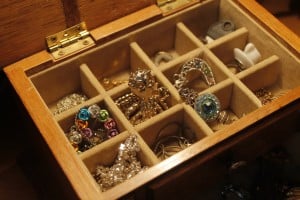
Psychology of Women Quarterly recently published a report citing the ineffectiveness of the coping strategies of black women dealing with racism in June. The black media outlets are debating this recent study and I thought to interject my personal opinion on this topic, on Daughters of Eve, since many of us have used incense, candles, and rituals as part of our way of life and/or spirituality.
I actually listened to the full podcast interview by the author of the study, Tawanda Geer. Sadly, when she spoke of using rituals and symbols, what followed as an example was crucifix and church. It is, therefore, unfair for me to really debate her research for I am sure her research volunteers are African-American women who identify as Christians. I’ve noticed she has received some flak from other Christians based on a very small article that was published ( http://www.eurekalert.org/pub_releases/2011-07/sp-aws071111.php). I highly recommend listening to her podcast in its entirely to better grasp the methods that she uses, including terminology (http://pwq.sagepub.com/content/35/2/215/suppl/DC1). This piece is regarding black women who are pagan.
Ms. Geer used two terminology; active spirituality and passive spirituality. Ms. Geer defined active spirituality as attending church (interacting with others) and passive as rituals (I will correlate this with solitary/non-interaction with others). Her definition of rituals (this is just what I’m interpreting) is prayer, holding a crucifix (or other religious symbols), burning candles, and lighting incense. As a non-Christian, I couldn’t relate to how any of the examples of “passive” are not active.
For black pagans, (I will use the term Pagan to define outside the 3 Abraham religions, or blending of one of the three religions with non-Abraham tradition, with respect). When burning candles, there is intention that goes into the selecting the color of candles and/or selecting a candle for specific purpose (decrease anxiety, welcoming positive energy, healing candles, binding, banishing, 7-day candles, etc.), and scent (if you use scented candles). Many of us don’t simply pick out a random candle without intention. The small act of lighting the candle and extinguishing the candle is sacred and thought out thoroughly for some of us. The process is active.
For black pagans, incense is also an “active” process, pending if we believe in deities, energy, and/or spirit. Each incense and/or fragrance is symbolic of a deity, a day of the week, a festival day, a cause (to bind, to cure, to heal, to ease pain, and to invoke passion, etc.), and energy. The process is active.
The use of symbols (pentacle, ankh, chaos, the wheel, crescent moon, etc.) holds power. All around, many of us believe that all that we do and use for our rituals and/or “work” holds power and intention.
I believe most of us would agree that incense, candles, and symbols are active spirituality, and all three are our rituals. At times, these rituals are not just for special occasions, but on a day-to-day occurrence. Similar to always having that first cup of coffee, for coffee junkies, in the morning has become a coffee drinker ritual.
Finally, Ms. Geer defined “active” spirituality as actually meeting like-minded people. She references attending church (a group of like-minded people) as “active spirituality”. It is a support group in the church that addresses the black female racial and sexist issues. I’m assuming “church” is equivalent to group circles, pagan pride events, pagan conferences, pagan internet live groups, and/or open rituals (as opposed to being solitary).
How do my rituals relate to being black, a woman, and pagan dealing with prejudice? Well, first I must say that pain is pain. I know there has been uproar within the black LGBT community and black heterosexual community (as in black heterosexuals who take issues with LGBT existence) with individuals (Wanda Sykes, for an example) giving HER personal opinion that being black is easier than being gay. I don’t live in her shoes or any other black LGBT shoes who believe Mrs. Sykes is “right.” I believe they have a right to feel the way they do and give voice to their feelings. Notwithstanding, when it comes to my personal views on “which is painful” (being black vs. being female) pain is pain. I don’t believe one is more than the other. I do believe having a combination of all three hits you at once and cuts the deepest; being discriminated because I am a black woman who is Pagan. This is where I truly appreciate the Wiccan Redes line, “Mind the three-fold path, you should. Three times BAD and three times GOOD.” Being hit by all three does sting. I’m sure the black lesbians, bisexual, and transgendered feel the same pain. Therefore, when I do meditate to relieve such pain—I ask for the pain to be, not separate, but combined and lessened. I don’t desire the pain to go away for I want to build up semi-immunity to it. I want to understand it so I can empathize with others. I want to master (which I am very close to it) the art of detaching and, when needed, and reattach to it. For I know that “isms” will never go away. I’m reasonable of my petition. I need to channel it vs. banishing it. At times, bind the pain.
Since I am a henotheist, (eclectic, as well) I call upon the spirits (deity, intermediaries, etc.) who share my skin color, my gender, who understand the pain of being judged, underestimated, and, at times, unappreciated and forgotten. I ask of the Goddesses, Loas, and/or spirits how they’ve found the strength and continued on since time immortal. All along with my candles, symbols, and incense as active tools…listening very carefully to the Great Mothers/Goddess share their tale and remedies.
I’m not disputing Ms. Geer’s research, for her research is based on a specific group of black women who do not share my religious identity. I will not discredit her, for I can’t fully relate. However, I’m sure there are fellow pagan, black women who could. These are black pagan sisters who are not around many circles with diversity. They may reside in a predominately black community, yet most of the spiritual groups are Christian-based (or Judaism, Islamic). The nearest circle may not have that much diversity. Some have experienced racial prejudice within the pagan community. Then, there are those who are Wiccan or follow one of the ancient “European” ways, and not the African Traditional Religion. The positive side of Ms. Geer’s research is awakening me to the thought of those sisters. Sisters who may very well be interested in an active group setting; yet, there are barriers, so to speak, that limit such group interaction. Sisters who are pagan, which would very much would like to discuss the superficial discrimination of being a black woman who is pagan beyond her friends, family, and community, who are Christians. Yes, black Christian women share the plight of sexism and racism, along with us. Yet, what of being non-Christian? Or a combination of three? There are times, I really don’t want to hear biblical quotes or “What Would Jesus Do?” With all respect to Jesus.
I call upon you all to send positive energies to those sisters from time to time. Set aside a “work” to alleviate pain and suffering. I also call upon those who have groups, website, blogs, group events of diversity to leave your information in the comment box (along with state and nearest city, if you will). Hopefully we can build a bridge of a virtual community of support, in love and light, to black sisters who are pagan, dealing with prejudices.
You are never alone along the path of Gods, Spirits, and our community.
Blessed Be!











